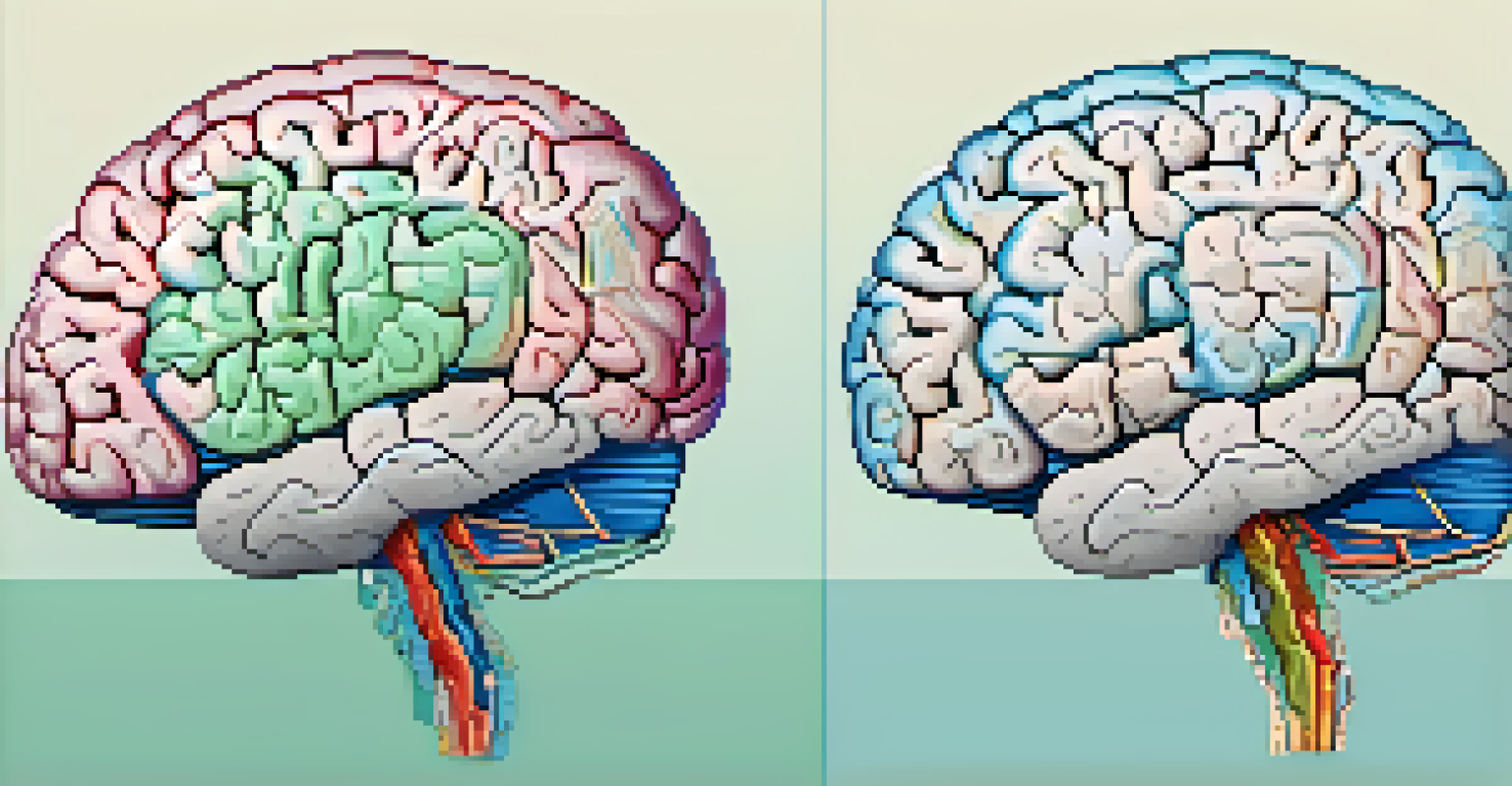Cognitive Load in Higher Education: Trends and Insights

Understanding Cognitive Load and Its Importance
Cognitive load refers to the amount of mental effort being used in the working memory. In higher education, understanding cognitive load is crucial as it directly impacts how students process and retain information. When cognitive load is too high, learning can become overwhelming, hindering academic performance and motivation.
The mind is not a vessel to be filled, but a fire to be kindled.
Imagine trying to juggle multiple balls at once; if you add too many, you inevitably drop some. Similarly, when students are bombarded with information or complex tasks, their ability to absorb knowledge diminishes. This makes it essential for educators to design learning experiences that align with students' cognitive capacities.
By recognizing the limits of cognitive load, educators can create more effective teaching strategies. This not only enhances student learning outcomes but also promotes a more enjoyable and manageable educational experience.
Types of Cognitive Load and Their Effects
Cognitive load can be categorized into three types: intrinsic, extraneous, and germane. Intrinsic load is the complexity of the material itself, while extraneous load refers to how information is presented. Germane load, on the other hand, is the mental effort dedicated to processing and understanding the material.

For instance, consider a complicated math problem. The inherent difficulty represents intrinsic load, while a poorly designed textbook that adds unnecessary confusion contributes to extraneous load. Conversely, effective teaching strategies that encourage deep understanding enhance germane load, enabling students to make meaningful connections.
Cognitive Load Impacts Learning
Understanding cognitive load is essential as it affects how students process and retain information.
Balancing these types of cognitive load is vital for optimal learning. By minimizing extraneous load and fostering germane load, educators can significantly improve student engagement and comprehension.
Trends in Cognitive Load Research in Education
Recent studies in cognitive load theory are shaping how we approach teaching in higher education. Researchers are increasingly focusing on the role of technology in learning environments, examining how digital tools can either alleviate or exacerbate cognitive load. This is particularly relevant as more institutions adopt online and hybrid learning models.
Cognitive load theory does not just provide a framework for understanding how people learn; it also offers practical strategies for optimizing learning.
For example, adaptive learning technologies can tailor content to individual student needs, effectively managing cognitive load by presenting information at the right level of complexity. However, excessive notifications and multitasking in digital platforms can overwhelm students, demonstrating the dual-edged nature of technology.
Understanding these trends allows educators to leverage technology effectively while being mindful of cognitive load. As the landscape of higher education continues to evolve, staying abreast of these developments is essential for fostering effective learning.
Practical Strategies for Reducing Cognitive Load
Implementing practical strategies can significantly reduce cognitive load for students. One effective approach is the use of chunking, which involves breaking down complex information into smaller, more manageable units. This technique helps students process information without feeling overwhelmed.
Additionally, the use of visual aids, such as diagrams or flowcharts, can enhance understanding by providing a clear representation of concepts. For instance, a visual summary of a lecture can help students recall key points without having to sift through extensive notes.
Types of Cognitive Load Explained
Cognitive load includes intrinsic, extraneous, and germane types, each influencing student engagement and comprehension.
Educators can also encourage active learning techniques, such as discussions or group projects, which promote engagement and understanding. By actively involving students in the learning process, they are more likely to retain information and apply it effectively.
The Role of Assessment in Managing Cognitive Load
Assessments play a critical role in managing cognitive load in higher education. Traditional testing methods can often create unnecessary stress, leading to high cognitive load and poor performance. Therefore, educators are exploring alternative assessment formats that better align with cognitive load principles.
For example, formative assessments, which provide ongoing feedback rather than a final grade, can help students gauge their understanding without the pressure of high-stakes testing. This approach allows for a more supportive learning environment, enabling students to focus on mastering the material.
Moreover, incorporating self-assessment tools can empower students to take control of their learning. By reflecting on their own understanding, students can identify areas of difficulty, reducing cognitive load and fostering a growth mindset.
The Impact of Multitasking on Cognitive Load
In today's digital age, multitasking has become a common practice among students, often leading to increased cognitive load. While students may believe they can effectively manage multiple tasks, research shows that switching between tasks can hinder overall productivity and comprehension. This phenomenon, known as the 'switching cost,' can significantly impact learning outcomes.
For instance, a student who frequently checks their phone during lectures may miss crucial information, leading to gaps in understanding. This not only increases intrinsic cognitive load but also adds extraneous load as students struggle to piece together information.
Technology and Cognitive Load Trends
Current research highlights the role of technology in managing cognitive load, particularly in online and hybrid learning environments.
Encouraging students to focus on one task at a time can enhance their overall learning experience. By promoting single-tasking strategies, educators can help students manage cognitive load and improve retention of information.
Future Directions in Cognitive Load Research
As the field of education continues to evolve, the exploration of cognitive load will remain a vital area of research. Future studies may focus on the impact of artificial intelligence and machine learning on cognitive load management, particularly in personalized learning environments. Understanding how these technologies can support students' cognitive processes will be essential for developing effective educational practices.
Additionally, interdisciplinary research may shed light on how cognitive load varies across different fields of study. For example, the cognitive demands in STEM subjects may differ greatly from those in humanities, prompting tailored approaches to teaching and assessment.

Ultimately, the goal of ongoing research is to enhance student learning experiences and outcomes. By continuing to explore cognitive load and its implications, educators can create more effective and supportive learning environments.